Paula Vince's Blog: The Vince Review, page 10
January 10, 2024
'Orley Farm' by Anthony Trollope
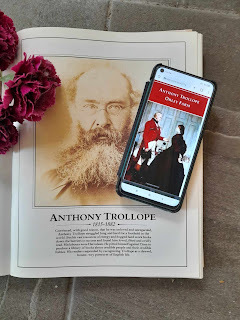
It's been years since I read a novel by Anthony Trollope. Back in my twenties I read a couple of the Barchester chronicles which I remember finding a trifle slow and meandering. I thought they might be more suitable for my dad's demographic than mine. This far down the track, I'm ready to try again. Especially since I've seen them recommended by several bookish friends on Instagram.
Trollope wrote 47 novels! He had an intensely productive work ethic. I won't necessarily aim to read them all, as I'm doing with his peer, Charles Dickens' major works. At that rate, reviewing one each year would take me until I'm older than 100! On the other hand, reading nothing but Anthony Trollope books back to back would take just a few years, but no way am I doing that either. I'll read one every so often, to help fill my quota of Victorian novels. That's all I'm committing to :)
So rather than tackling one of his series, I'll start with the occasional stand-alone title. I'd seen this one recommended, so got hold of a free kindle version.
MY THOUGHTS:
I ripped through this massive Victorian court case novel. What makes it so compelling is that the 'bad guy' is the wronged party, and the lovely, gracious lady is the 'crook.' Trollope is playing around with his readers' headspaces, making us want to see justice averted.
The backstory occurs twenty years prior to this novel's start. When elderly Sir Joseph Mason dies, everyone assumes that his eldest son, also named Joseph, will inherit both family properties; the smaller but productive Orley Farm along with the large family seat, Groby Park. Indeed, that's what Joseph Junior has been led all his life to expect.
However, old Sir Joseph recently married a very young woman and now has a baby named Lucius, who's a full forty years younger than his half-brother. A codicil was added to the will, bequeathing Orley Farm, the smaller property, to his infant son. Joseph Mason angrily disputes the will after the old man's death but loses the case. Peace has reigned for twenty years, but something outrageous is about to be unleashed. Fast forward to the start of this book.
Samuel Dockwrath, a disgruntled former tenant of some Orley Farm land, approaches Joseph Mason with strong evidence in his favour that's been lying dormant for two decades. It appears that Lady Mason forged the signatures on the will, anxious to provide for her own baby son. (For some time, Trollope makes her guilt crystal clear without stating it outright, so this is no spoiler.) Now Lady Mason, a valued friend and neighbour to many, may be arrested as a felon. And Lucius, a forward-thinking young experimental farmer whose high principles tend to be black and white, has no inkling of his mother's dodgy maneuvre on his behalf.
We don't want to see her suffer the consequences of a crime based on the tenderest love, which may include deportation to the colonies. And we certainly don't want to see grumpy, greedy Joseph Mason take over Orley Farm, which he'll rent out to the smug and odious Dockwrath. Not when his young half-brother has exciting plans to maximise its potential. So are we readers supposed to hope the lie will win out? Lucius Mason once rejected his mother's suggestion to consider studying for the law, since he has an idea that all lawyers are basically dishonest. Little does he know his mother may count on that very thing, for his sake!
Mr Thomas Furnival is the barrister defending Lady Mason. He's fallen prey to her charm, although he's convinced of her guilt, and his devotion to her cause has caused friction in his own marriage. (Oh dear, many of us could tell you that passive aggression and sulky guilt trips don't work on guys, Mrs Furnival. It just makes them uptight and defensive, and therefore more inclined to blame you to justify their own behaviour.)
Sir Peregrine Orme, the local landed gentry, is the stately old widower in the mansion next door. He falls in love with Lady Mason and longs to rescue her from her plight by marrying her, to the chagrin of his grandson, young Peregrine. And Sir Peregrine's daughter-in-law, Edith Orme, is one of the loveliest characters in the book; a gentle and gracious friend who takes doing a friend's dirty work to a whole new level.
It's interesting how both opposing parties use scripture to strongly justify their questionable attitudes. Lady Mason reasons that she was taking the precedent of the biblical matriarch Rebekah, who was prepared to cheat to gain an inheritance for her beloved son, who would otherwise have been left out in the cold. And arguably the principled and energetic young Lucius turns out to be a 'better' heir than his vitriolic older half-brother, just as Jacob trumps Esau. For his own part, Joseph Mason is all about wreaking righteous vengeance on the head of the woman who prevented him receiving his full inheritance. This dour, pitiless man prides himself on carrying out the letter of the law. 'All that I have done from my youth upward,' were his thoughts about himself.
There are also plenty of amusing side-characters, such as the travelling merchant, Mr Kantwise, who carts around what sounds like the Victorian version of an IKEA ensemble and assures everyone that wooden indoor furniture is going out of vogue, and iron is where it's at. What I appreciate about Anthony Trollope is his fairness in showing the strengths and weaknesses of all his characters. His narrator sometimes tends to interrupt the flow of conversations, but since his voice has the sense of humour I enjoy, it's all good.
Trollope is very much easier to read than his contemporary, Charles Dickens. This book took me a steady fortnight to read rather than the full month I'd expected to put aside, based on Dickens. The ethical dilemmas and awkward relationships of Orley Farm guaranteed that I kept turning pages, but I still can't decide whether I consider the ending of this one disappointing or satisfactory. Perhaps all that can be said is that it is, in a way, inevitable.
🌟🌟🌟🌟½
January 3, 2024
My 2024 Reading Agenda

Happy New Year, friends and followers. We welcomed 2024 by watching fireworks on the beach at Brighton after a free train ride.
My most delightful news is that we've finally erected a new pride and joy. This street library is the carpentry project my hubby has been working on for quite some time. It is now up and running out by our street side fence. We've had it operating for less than a week and already I'm finding it great fun to facilitate excellent quality free books to the community. Ever since I first started hunting down these little free libraries, I've dreamed of joining the network. It's finally happened. Such a wonderful outreach for a bookworm, don't you think?
Incidentally, it's also been set up as a Pokemon pit stop. A passionate neighbour on our community chat FB group came and did that.

Now, I've been dedicated to delivering a weekly, book themed blog post on Thursdays or Fridays for quite some time. 2023's is complete. I'll have another crack at it for 2024, although a few factors might slow me down.
1) I've had a hankering to re-read some good novels which I've already reviewed. It won't be necessary to give them two reviews.
2) I might spend some time working on my fiction projects. I'll share more about this when (or if) they come to fruition.
3) It turns out I've been functioning for at least the last few years on an empty tank. I've started 2024 with a much-needed iron infusion. I didn't know how urgent it was until I had some blood tests the day before Christmas Eve. They were my first since 2019. Oooh, now I understand why I've been puffing and panting while climbing slopes and doing housework. Maybe I should slow down in general.
However, I'll see how I go. Since this blog is one of my favourite hobbies, I may well end up with 52 posts after all. If you'd like email notifications whenever I add a new post, just click the subscribe button in this blog's toolbar. I peomise you'll never be spammed, and you won't miss a single one either, however frequently or infrequently I post.
For the past few years, I've been adding a new blog page for the start of each new year. In 2022 it was my Trixie Belden Marathon, which was a burst of nostalgia I adored. Last year at the start of 2023 I added my Agatha Christie, Queen of Crime page, which is more of an ongoing, slow burn. For 2024 I've decided to add Spiritual Classics. That'll have to be uplifting, right? I've already added a list of older posts to kick it off, and you'll see that fiction titles trump non-fiction for now.
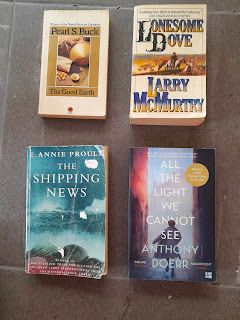
I'll finish off with a rough agenda for the start of this year. No doubt I'll latch onto something unanticipated which will snowball. But for now, I have these four Pulitzer prizewinning titles picked up from various places, so I'll factor them into my early reads of the year. I've also acquired a good handful of WW2 fiction, including a couple that were gifts. It's time I got stuck into them. And of course I'll include some Victorian novels. I haven't missed a year of at least one Dickens novel since 2017 when I started my quest to read all his major works. It's taking a while, but too much Dickens all at once makes my head explode.
I hope you'll stick with me, enjoy my reviews and discussions, and share your own reading journey during 2024.
December 27, 2023
2023 Top Ten Wrap-Up
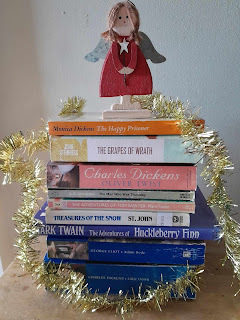
It's hard to believe another year is almost done and dusted. I'm happy with my reading and reflections throughout 2023 and I've also ticked off enough Creative Writing and Communication subjects at Tabor College to acquire my Graduate Diploma. At the end of each year I re-assess whether I should keep this blog going, since it's time consuming. The same twofold reason makes me say YES again. Since I'm always writing anyway, it's another good outlet for me to hone my craft and rave about books at the same time, which I've loved doing from the time I was tiny.
Here, in no particular order, are the ten shining lights of 2023, from among the 50+ books I read and reviewed. Please click on the titles, for my reviews of each.
1) Demon Copperhead. Barbara Kingsolver's award-winning retelling of Dickens' classic novel ticks every box. It's a modern mirror in every way. The young hero Damon Fields is arguably even more charismatic than his model, David Copperfield. And this story's counterparts to Dickens' other characters make me smile and prove that human nature doesn't change. (This was a library book and therefore not in my stack photo.)
2) Little Dorrit. This year's pick from Dickens himself has put the grim Marshalsea Prison on the map of places to visit while in London. The story aimed to show the corrupting and personality-changing influence of big money, especially in the form of sudden windfalls. It is also full of deeply buried family secrets and sudden disaster.
3) Adam Bede. More Victorian drama, this time from George Eliot. I appreciate her charming pastoral touches and her pioneer spirit in venturing to focus on working class families, rather than the gentry who were normally highlighted in novels of her era. Eliot's books are valuable historical documents as well as excellent stories. This one is all about the huge impact of youthful indiscretions and the struggle to earn back trust once it is lost.
4) Treasures of the Snow. The snowy mountains of Switzerland make a great backdrop for this juvenile tale of unforgiveness and revenge. The main girl and boy, Annette and Lucien, are both excellent protagonists-cum-antagonists. And their two mentors, Annette's grandmother and Lucien's unlikely friend, the gruff old man of the mountain, drop some truly wise lines we are never too old to take to heart.
5) The Man Who was Thursday G.K. Chesterton's teeming and colourful imagination brings us a fanciful, picaresque version of his own turn-of-the-century London. Gabriel Syme is a double-agent opposed to anarchy who completely misrepresents the characters of his fellow agents, who are all named after the days of the week.
6) Oliver Twist. I read two Dickens titles this year and they both make it onto my annual Best-Of list. This sweet and humble 11-year-old finds himself the pivot around which all types of low-life from the London underworld swarm. And they all have their reasons. He's in almost too deep to be rescued for the peaceful, respectable lifestyle which he craves.
7) The Adventures of Huckleberry Finn. This must be my year for finally catching up with famous classics about exceptional boys. This is an amazing tale about a misguided morality issue, and the 13-year-old whose heart prompts him to do the right thing, while his conscience accuses him of doing serious wrong. The great Mississippi River forms the backdrop of the action.
8) The Grapes of Wrath. Anger is a great prompt for social justice, when the right person wields his pen. John Steinbeck was furious enough about the plight of the displaced tenant farmers who were forced interstate to find work during the Great Depression to create the ultimate Dust Bowl novel. Several members of the down-and-out Joad family have become mouthpieces and icons of a movement which was just ripe to happen. Especially Ma, the family cornerstone; and Tom, the straight-talker with his heart for revolution.
9) The Happy Prisoner. I read this one way back in January and it's remained in my Top Ten all year. Oliver North, a young war veteran who has lost his leg, narrates this story from his bed where he's recuperating surrounded by quirky family members. The fact that his voice held me captive throughout the novel proves that any modest setting will suffice for a truly witty and winning personality to shine. And we can benefit from Oliver's hands-on revelations about busting bad moods.
10) The Adventures of Tom Sawyer. The more I read over the conversations of these impressionable, adventurous, superstitious and energetic boys, the more waves of nostalgia wash over me. We don't have to have been alive in the mid-1800s to remember how seriously we took our play-acting before we hit High School. If we have forgotten, I reckon the chats of Tom's gang will whiz us back decades.
So those are my ten top reads of 2023 and when I looked over my spread of options, they were all clear stand-outs.
Honourable Mention - Spare I'm giving this controversial memoir a quick plug because when I revisited all this year's books, I re-read my prediction that it might be among my top ten reads. Sorry Harry, it's not even close. Yet if I extended my list to 15 or 20 it might be a contender. In spite of all the flak he got for writing it, I can see how Prince Harry felt a humanitarian obligation to lift the lid on his disturbing lifestyle which made him an exhibit just for being born, and a magnet for the world's heartless media.
Wooden Spoon - Naw, I won't be mean enough to award one this year.
I wish you all happy reading and holidays as we swing into 2024. I'll touch base early in January with my plans for this blog in the year to come.
December 20, 2023
'Hercule Poirot's Christmas' by Agatha Christie

I never planned to review two Agatha Christie novels back to back on two consecutive weeks, but hey, it's Christmas week. It seemed a no-brainer to give the slot to this quick and entertaining Yuletide murder.
MY THOUGHTS:
This could be called catastrophe at Christmas time.
Simeon Lee is a detestable old man who invites his adult sons and their wives home to Gorston Hall for a Christmas family reunion, seemingly out of sudden sentimentality in his old age. But really it's to insult them, set them off against each other and enjoy the resulting mayhem. This is arguably a book about reaping what we sow. Old Simeon gets what's coming to him in one of Agatha Christie's more gruesome murder scenes.
At the start, Christie dedicates this mystery to her brother-in-law, James, who'd joked that her crime scenes were getting a bit anemic in his opinion and needed the occasional brutal bloodbath to spice them up. Agatha hoped this would tick his boxes. She has Simeon Lee's throat cut with a loud, spine-chilling scream and blood spattered over upturned furniture and smashed ornaments. And when the family burst in on the scene, Simeon Lee's daughter-in-law, Lydia, quotes Lady Macbeth when she remarks, 'Who would have thought the old man to have had so much blood in him.'
Of course it's almost farcical that Lydia would have been cool and collected enough to drop such a corny line at such a shocking moment, rather than just a one-word oath or a scream. I guess for Agatha it all compounded the effect of James' Christmas gift.
In all honesty, this story is a seasonal melodrama from start to finish. The son characters are all typecast caricatures. Was the murderer Alfred, the gentle conformer who claims to love his dad? Or David, the sensitive artist who loathes his father because of the heartache inflicted on his gentle mother? How about George, the tubby politician whose parasitic lifestyle is threatened by Simeon? Or Harry, the flashy and arrogant Prodigal Son who throws his weight around with no scruples about who he offends? Could any of their wives possibly have committed a crime so appalling? Maybe it was Pilar, Simeon's only granddaughter, the bloodthirsty young woman with Spanish heritage from her other family connection.
Police Superintendent Sugden is on the case and getting off to a thorough start of investigations. The Chief Constable, Colonel Johnson steps in to lend a hand, and his houseguest turns out to be none other than... drumroll... Hercule Poirot!
The setting isn't as festive as I'd expected. There is not a decked-out tree or wreath in sight, although as the characters themselves point out, the savage slaughter of their patriarch dampens the jollity. I just thought some trimmings might have been put up beforehand, but perhaps if anyone had the nerve to hang a sprig of mistletoe anywhere near this resentful, brooding mob, it might have backfired badly and caused another murder.
The colonel is initially surprised to be summoned to a murder scene at Christmas time, as he assumes no crimes take place in a holiday period of cheer and goodwill. Poirot argues that irritability brought on by overeating and subsequent indigestion makes Christmas a prime time for murder, because people who don't feel inclined to be amiable have put themselves under more of a strain to appear so. His conjecture seems spot-on with the Lee family.
I was pleased with the revelation of the murderer. I'd truly been wondering how Christie could pull off her Wow! factor with such standard suspects, any of whom would elicit a 'Meh,' from me. She manages though. It's a cheeky and audacious effort by the crook, accidentally helped along by the red herring masquerades of certain others. Taken altogether, the whole set-up of this one is way over the top, but I think Agatha Christie knew a crime writer can get away with lots at Christmas time when readers are inclined to be more indulgent.
🌟🌟🌟
December 13, 2023
'Murder at the Vicarage' by Agatha Christie
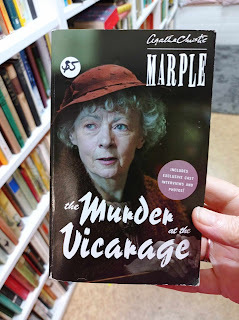
‘Anyone who murdered Colonel Protheroe,’ declared the parson, brandishing a carving knife above a joint of roast beef, ‘would be doing the world at large a favour!’ It was a careless remark for a man of the cloth. And one which was to come back and haunt the clergyman just a few hours later – when the colonel was found shot dead in the clergyman’s study. But as Miss Marple soon discovers, the whole village seems to have had a motive to kill Colonel Protheroe.
MY THOUGHTS:
This is the first full length novel featuring Miss Marple and takes place in the village she calls home, St Mary Mead. The story is narrated by the vicar, Leonard Clement, who has a likeable blend of wisdom, curiosity and self-deprecation. He makes such wry observations as, 'I preceded to follow the example of the devil in quoting scripture for his own ends.'
One of Len's church wardens, Colonel Lucius Protheroe, is discovered shot through the head in the study of the vicarage. The thing about Colonel Protheroe is that nobody really liked him, including his wife and daughter. Protheroe was a dour and outspoken advocate for a more militant Christianity, with far stronger punishment in the name of justice. Needless to say, that attitude got lots of people's backs up.
He was also a tedious know-it-all. Dr Stone, the archaeologist, says, 'Because he had read a few books, he set himself up as an authority, against a man who has made a lifelong study of the subject.' We all know the type. Colonel Protheroe was one of those guys.
Motives for Protheroe's murder are everywhere. In fact, several people recently stated that the world would be far better off without him, including the vicar himself. Len was using exaggerated hyperbole, which he regrets, especially after the murder took place in his own house. But presumably, some other person meant every word.
At first I found it a stretch to believe that so many people would tell the vicar, of all people, that they wished the colonel would die. Surely it would make more sense for the real murderer not to say it outright at all. Miss Marple's nephew, Raymond West, agrees with me. He says, 'Of course, if your subconscious were really planning to do him in, it would never have allowed you to make that remark.' Does that general rule hold true for everyone who vocalised that wish? Hmm, maybe or maybe not.
The rude and abrasive Inspector Slack is assigned to the case, but he has not half the skill of the modest but astute Miss Marple, whose favourite hobby is people watching. The twist, which only she manages to unravel, is very smart. Some slick and clever crime is uncovered.
As an interesting philosophical aside, the local GP, Dr Haydock muses that some poor criminals may have medical conditions that cause them to commit crimes they cannot really help. This was 1930 and nearly a century later, the issue of such accountability is still a bit of a grey area. Haydock is so passionate about the subject, I wonder if he was the mouthpiece for one of Dame Agatha's own hobby horses.
We get to meet the illustrious Raymond West, who is often merely mentioned by his aunt in other stories. He's portrayed as one of those pretentious, down-his-nose literary authors. (The sort who writes poems with no capital letters.)
I also found out what trencher salts and tazzas are; knowledge I never realised I lacked until now. Friends, don't assume you know the name of everything that may sit upon a table top.
Overall, it's a great debut for a lovable sleuth, but a bit sad to think that such unlovable people as Colonel Protheroe exist in the world, not to mention filling church eldership roles. The ironic phrase, 'It couldn't have happened to a nicer guy,' fits him to a tee.
🌟🌟🌟🌟
December 6, 2023
'The Adventures of Huckleberry Finn' by Mark Twain
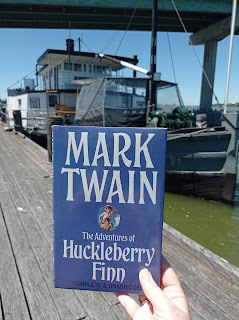
As promised, I'm following up my reflections about Tom Sawyer with fresh ones about Huckleberry Finn. I knew it's generally regarded to be the superior book and looked forward to putting it to the test.
MY THOUGHTS:
Whoa, I can see why this is regarded as one of the best anti-racial American classics ever written. What an unforgettable epiphany.
This book immediately differs from The Adventures of Tom Sawyer. Huckleberry Finn tells his story first person, which gives it an intimate touch that suits the soul-searching tussles awaiting him. Reading every line in Huck's unique vernacular really unites us with this boy. His keen intellect is hampered in expression by his lack of education, yet he still finds an eloquent way.
At the conclusion of his friend Tom's story, we left our hero chafing under his own generous reward, which seems to him more like a stroke of misfortune. The Widow Douglas, grateful that young Huck saved her from the evil plans of Injun Joe, has resolved to adopt and 'sivilise' him. But her strict and nitpicky sister, Miss Watson, moves in and hijacks Operation Reform. It's all too much cultural overload for poor Huck. What's more, his sole source of respect in the eyes of other boys, his freedom, has been snatched away.
Meanwhile, Huck contends with a dangerous obstacle that privileged boys like Tom wouldn't dream of; his drunken, abusive father. Mr Finn's redeeming qualities have been drowned in grog, if they ever existed to start with. Instead of feeling grateful and amazed that his son has been offered an opportunity for education, accommodation and stability with no strings attached, he burns with bitter resentment and makes it his goal to pull the plug on it. 'Pap' Finn is, perhaps, one of literature's biggest losers. And he really wants to get his grubby hands on Huck's proceeds of the treasure that was shared between him and Tom.
Feeling like the meat in an incredibly explosive sandwich, it's no wonder poor Huck decides his only recourse is to fake his own death and run away. Bumping into Miss Watson's escaped slave, Jim, on Jackson's Island, is a happy accident. The pair of driven fugitives decide to team up and travel via the Mississippi River up north where Jim will be free and Huck will be unknown.
Along the way, our boy realises that he bears an inbuilt moral code. Early on he professes never to see any personal benefit to the widow's concept of praying for the spiritual gifts, since all the generosity and thoughtfulness will flow to others rather than himself. So he stops praying. Yet whenever it comes to the crunch, Huck chooses empathy and compassion as his pilot light every time. This puts him in some gnarly ethical dilemmas, especially regarding his responsibility to Jim.
A lifetime of social conditioning has convinced Huck that his sensitive and humane conscience is, in fact, immoral! He thinks that by following his compassionate instinct to help Jim escape, he's bringing down heavenly retribution on his own head. He even contemplates turning Jim in as the 'right' thing to do.
Shocking as it is for me to read how a boy can consider for one moment the corrupt lie that some human beings have the right to own others, in Huckleberry Finn's own mind he's committing grand larceny. Huck is projecting onto God the slave-owning mentality of the southern states before emancipation, which is all he's ever known. It's a huge hurdle for one lonely, poorly-educated 13-year-old to question the philosophy and theology that has always hummed around him.
To him, it seems more logical to judge himself as corrupt and wicked for wanting to help, than to transfer that label to his formative social structure, including the stream of pastors, teachers, care-takers and Sunday school superintendents who have poked their noses into his life. It takes a rare individual to do as Huckleberry Finn does, and stick to his own sound moral compass, even when he believes it may be leading him off course and straight to hell.
'Alright then, I'll go to hell,' may be the most profound line in the book. It's pure genius of Mark Twain, to have his southern boy-hero come to embrace a staunch abolitionist way of thinking off his own bat.
This fascinating introspection is embedded in high adventure and run-ins with several other colourful characters. Jim himself has as many superstitious taboos as the biblical Pharisees had crazy laws, but runs rings around Huck's own father when it comes to a providing a loving presence in the boy's life. The antics of the 'Duke' and the 'King'; a pair of shameless conmen who latch onto our two travel companions, puts Huck's peace loving nature at odds with his need to take action. And although she's featured in just one chapter, I love the wisdom of Mrs Judith Loftus, the lady who calls Huck's bluff when he thinks he's assumed an excellent disguise.
Finally, I can't sign off without griping about the Tom Sawyer factor. Whenever Tom steps into the picture, he's incredibly bossy and obnoxious. This kid's delusions of grandeur surely dwarf Mount Everest. He insists on acting out his fantasies, knowing full well his acquiescent friend Huck will eventually cave in to his outrageous demands.
I was finally willing to overlook how Tom played on Aunt Polly's grief in the last book so he could walk in on his own funeral, but now he's gone too far. Tom is up to another heartless stunt for his own glory, with absolutely no scruples for the feelings of the anxious people he is stringing along. I don't know about other readers, but it frustrates me to see Jim humble himself to kowtow to such bizarre and childish behavior, and to see the quick-thinking and resourceful Huck revert back to his default role as this show-off's loyal sidekick.
Bottom line now I've read both books - when it comes to Mark Twain's famous boy duo, much as I love the truly contemplative and heroic Huck, I kept wishing someone would deliver Tom a good punch in the face.
(I'm getting psychological now, but I can't help thinking Tom gets envious when he hears all about Huck's real adventures, and feels the need to compensate by making himself ringleader of the most dramatic pretend ones he can invent, which just happens to involve manipulating other people and toying with Jim's life.) Anyway, the bromance which I thought so healthy in the first book has sadly taken a toxic turn, especially now we see Tom sweep Huck along for a cruel ride along with everyone else.
Notwithstanding the Tom factor, I love this book. Huck is a humble and gentle soul, and also a survivor whose unfolding character arc is a masterpiece. I would never tire of reading his heartfelt and evocative descriptions of life along the river, and enjoying more of the 150-year-old sunrises we get to sample within these pages.
🌟🌟🌟🌟🌟
November 29, 2023
'The Adventures of Tom Sawyer' by Mark Twain
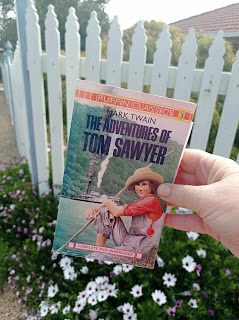
I discovered both books comprising Mark Twain's most famous duo in different free street libraries within a short period of time. I've taken that as a sign that it's high time to read them. I say that as a tribute to Mark Twain. It didn't take long to see that his characters themselves are HUGE believers in signs and superstitions within the pages of these novels. Interestingly, it turns out that his birth coincided with the appearance of Halley's Comet, as did his death with its next appearance. And Twain himself predicted that would be the case. 'It will be the greatest disappointment of my life if I do not go out with Halley's Comet. The Almighty has said, no doubt, "Now here are these two unaccountable freaks; they came in together, they must go out together."' Call it coincidence or self-fulfilling prophecy, I'm sure he would have been pleased.
I'm starting with Tom Sawyer and will finish up with Huckleberry Finn soon.
MY THOUGHTS:
I finally read this famous antebellum classic about the mischievous Tom who's such a handful for his long-suffering Aunt Polly. Mark Twain considered it his homage to childhood days and he sure wasn't kidding. At first I was a little apprehensive it would be all beetle races, Robin Hood re-enactments, incantations to recover lost marbles, and cheating to win Sunday school prizes - but then it got interesting and I was hooked. For me, the drawcard begins when Tom and his mate, Huckleberry Finn, witness a grisly grave robbery and brutal murder in a cemetery at midnight, followed by the framing of an innocent man, putting the boys in a fearful moral dilemma.
But that's enough flirting with plot points. I want to focus mostly on character traits. Oh Tom, Tom! He could be called a lovable larrikin, a shrewd businessman (shown by the iconic opening incident with the white picket fence) or an unconscionable, callous little arse! All three are accurate depending on a reader's own starting point. Speaking from a mother's perspective, he crosses a line for me into the third description. The stunt he pulls on poor Aunt Polly, Mrs Harper, and everyone else deserves far more retribution than he ever receives. (It was quite a stunt though, I grant you that!)
Tom's abundant energy and confidence makes him a natural leader, but he uses his imagination to borrow from and cruise by on the genius of others. Tom draws heavily on hackneyed stereotypes he gleans from the stories he loves, and weaves them into play activities for his own gang, who don't have such a broad knowledge base of yarns and legends. So I consider this book to be a tribute to the power and influence wielded by writers and storytellers, as much as it is an ode to childhood. Done well, their stories contain power to shape and inform their culture by hijacking people's enthusiasm, and Mark Twain himself participates in the wonderful ripple effect with this very book.
I tend to think Tom's dynamic combo is an overbearing personality coupled with a vast knowledge and respect for great stories. It gives him an irresistible 'power' persona that covers over many rough edges. And if those are smoothed when he grows up a bit, he probably has a bright future.
But to me, Huckleberry Finn, the town's 'juvenile pariah' provides much of the book's charm. He's the neglected son of a raging alcoholic, hence in the adults' eyes, no fit companion for civilised kids. Although Huck wears cast-off adult clothes, a bit like Dickens' Artful Dodger, he doesn't carry the style off with quite the same panache. There is a certain wistfulness surrounding Huck, who's aware that he's regarded as untouchable by most adults. Yet at the same time, he appreciates being envied by other boys for his freedom from responsibilities such as school and church attendance.
Tom is by far the most gung-ho, cocky member of their friendship group. Huck is his follower, and more cautious and thoughtful in his approach. While Tom revels in being the centre of attention, Huck shuns the spotlight. But he has a courageous core, enabling him to put up with being unwelcome wherever he shows his face. Far from being a bad influence on Tom, it tends to be more the other way around. (Not that I'd go so far as to call Tom a bad influence on Huck, since poor Huck is in need of a true friend.)
Tom's youthful romance gets a fair airing. Becky Thatcher is first presented as 'a lovely little blue-eyed creature with yellow hair plaited in two long tails, white summer frock and embroidered pantalettes.' But far from being as sweet as she appears, Becky is a manipulative little miss, adept at using her feminine wiles for unworthy purposes. Mark Twain appears to have infiltrated the calculating and sometimes tortured headspaces of pre-teen girls, and his accuracy impresses me. The ups and downs of Tom and Becky's relationship indicates precisely why 11 or 12-year-olds shouldn't indulge in love affairs. But perhaps the pair of them deserve to end up with each other in the long run, take that how you will :)
Just because Tom Sawyer himself is heedless and thoughtless doesn't mean we readers have to be. I find the story urges us to ponder the true meaning of success, which may be more modest than we think. Muff Potter, the hopeless drunk, is by all accounts a 'no-account.' Yet his small kindnesses over the years to Tom and Huck may end up saving his life. The boys might not have been as willing to risk their safety to defend someone more like the harsh and exacting school master, Mr Dobbins, who has achieved a far more 'successful' position in worldly terms. (Not that Dobbins would ever find himself in Muff's position, but you know what I mean.)
The book is well worth reading, but we may need to suspend our disbelief. It's not just any old evocation of a southern, small-town world, but one in which the following may happen.
1) Random treasure chests, chock full of coin, may be buried anywhere, so you might as well dig around with your pick and shovel. Your chances of becoming filthy rich are as good as anybody's.
2) Search parties tend to be a bit lame, which you can use to your advantage.
3) Superstitious rituals are generally reliable. When your expectations don't come to fruition, it's probably because witches have interfered.
4) The same two boys may accidentally eavesdrop on the vile plans of the most degenerate wretch they know, not merely once but three or four times. Either together or separately.
I'm right into the goings-on at St Petersburg on the Mississippi now. Bring on The Adventures of Huckleberry Finn. I'm anticipating that Huck, as the main protagonist, will bring a more reflective slant to these rollicking adventures, which may contrast nicely with this book's focus on the impulsive, surface-skimming Tom.
🌟🌟🌟🌟
November 23, 2023
'The House on the Strand' by Daphne du Maurier
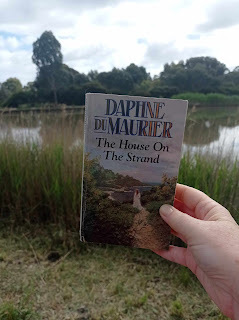
Dick Young is lent a house in Cornwall by his friend Professor Magnus Lane. During his stay he agrees to serve as a guinea pig for a new drug that Magnus has discovered in his scientific research.
When Dick samples Magnus's potion, he finds himself doing the impossible: traveling through time while staying in place, thrown all the way back into Medieval Cornwall. The concoction wear off after several hours, but its effects are intoxicating and Dick cannot resist his newfound powers. As his journeys increase, Dick begins to resent the days he must spend in the modern world, longing ever more fervently to get back into his world of centuries before, and the home of the beautiful Lady Isolda...
MY THOUGHTS:
This is one of du Maurier's Cornish tales with a timeslip theme thrown in. It was published the year of my birth, so I was curious to see how the 'modern' thread had aged.
Dick Young, the main character, is staying at Kilmarth, the boyhood home of his friend, biophysicist Magnus Lane. (With a name like Magnus, I reckon his parents destined him to become a ground-breaking, experimental scientist. Doesn't it seem perfect for the stereotype?) As part of the deal, Magnus coerces Dick into sampling the wonder-drug he's been working on, which spirals its users back centuries, yet always on their own local turf.
Dick consistently ends up in the fourteenth century, and always touches base with a mysterious guy named Roger, prompting Dick to wonder whether Roger's brain is the random link to the mind of any time-tripper. Nobody from the 1300s, including Roger, ever seems to see futuristic visitors. Dick verifies Magnus' experience, that every sense, except for touch, is heightened whenever they visit the past. However, only their brains are really taking the trips. Their physical bodies are still lumbering blindly about in their contemporary world (1969), vulnerable to sudden peril such as collisions.
Dick keeps trying to convince himself that he's not addicted to his trips, but can't help admitting he is addicted to his infatuation with the beautiful Lady Isolda Carminowe, who keeps him returning for another 'fix' of her.
My googling tells me Dame Daphne got really excited about this story, considering it to be one of her finest. She intended for readers to be sucked into the implicit questions she was raising. Was Dick really progressing back in time, or was it some elaborate mental hallucination? Is the concept of time, rather than being a linear projection, 'all-dimensional' with past, present and future spinning like a wheel simultaneously? All Dick can say for sure is that the people he enjoys spying on have been dead for over 600 years, yet they're alive in his escape world. Sounds like a recipe for a page-turner, right?
Sadly, it fell flat for me. Neither of the two time periods held my interest. The political intrigue and family saga of Roger and Isolda's world felt like wading through quicksand. There are far too many family connections to keep track of and too much standing around talking. As for Dick, he lives up to his name too well. Each of his unfolding personal disclosures made me eyeroll more.
He flicks his cigarette butts around the countryside, he hasn't visited his mother in over a year because he's too lazy, he's getting tired of his wife, Vita, after just a few years of marriage, and prefers his 'trips' to stalk the more attractive Isolda. He professes to have not a flicker of interest in his two young stepsons, who incidentally strike me as nicer people than he is. He gets grouchy and irritable with everyone in his real world. He resents Vita for her concern regarding him, which turns out to be completely justified. I kept finding the pages of Dick's narration progressively harder to turn.
All this story really has going for it is du Maurier's hallmark description of Cornwall. Sadly, Cornwall alone is insufficient to maintain my interest in a story with a crawling plot and unlikeable characters. The premise sounded great... but it fell short. Sorry Dame Daphne, it's a no from me.
🌟🌟
November 16, 2023
'Yellowface' by Rebecca F. Kuang
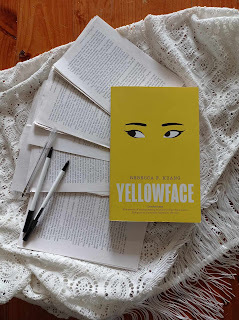
Athena Liu is a literary darling and June Hayward is literally nobody.
White lies
When Athena dies in a freak accident, June steals her unpublished manuscript and publishes it as her own under the ambiguous name Juniper Song.
Dark humour
But as evidence threatens June’s stolen success, she will discover exactly how far she will go to keep what she thinks she deserves.
Deadly consequences…
What happens next is entirely everyone else’s fault.
MY THOUGHTS:
I was delighted to discover this novel in a little free street library, and cancelled the hold I had on it at the library. It's all over book platforms at the moment, so I prioritised it on my reading pile.
June Hayward is a jaded, obscure young writer out for the evening with her brilliantly successful friend, Athena Liu, who has had several award-winning bestsellers with major publishers. When Athena dies suddenly after a freak accident, June snatches the chance to steal a freshly completed manuscript from Athena's desk. It's the first draft of a World War One novel entitled, 'The Last Front,' which focuses on the heroic efforts of the Chinese Labour Corps which were largely unacknowledged at the time.
After making some sneaky alterations, June gets a contract under her own name with a prestigious publisher. Throughout the rest of this story she adroitly dodges discovery while enjoying the lifestyle of a famous author and justifying to her innermost self why her action wasn't despicable plagiarism. There are also pesky accusations of cultural appropriation to fend off, not to mention pressure to produce her next blockbuster. Will the truth lie dormant forever?
To maintain the new lifestyle she's craved for so long, June becomes a progressively worse human being, which she deems vitally necessary to avoid regression or discovery. Everything about her is false, calculating, opportunistic and manipulative, including her version of how close a friend she really was to Athena Liu. Yet disturbingly, June's insistence that duplicity is the price she must pay to remain a media darling rings true. Being unknown and forgotten, after a taste of the spotlight, is her greatest dread. It makes me wonder how many big name authors and other celebs behave through a filter of, 'How will this make me look?'
Kuang reveals plenty about the book industry which may surprise the uninitiated. She presents a world in which there is a finite number of book contracts with competition rife, like seagulls swooping on chips; where one minority author's success may create barriers for others writing in the same genre, rather than the green lights we may expect. Crowds of consumers (in this case, readers) assume a macro-personality far more daunting and impersonal than those of the individuals who comprise it. Ms. or Mr. Public Opinion isn't necessarily a giant whose approbation we can seek without being tarnished, yet so many of us seek it anyway, in our own small ways. And tsunamis of social media passion are toxic. Think cancel culture.
I relate to a lot of the reading and writing culture described in this story, having written and made huge efforts to market my own published novels for years. Yet there are surely several others like June's mother and sister, who simply read the occasional novel to relax without giving the actual industry a thought. This makes me wonder how Yellowface itself has become such a bestseller, since not everyone is trying to peddle their own books. I guess the theme about exposing fraud and the tense thriller elements must carry weight.
Overall, I'd never add this book to a list of my best reads of the year. I think it makes me read in a mean-spirited way, eager to find out how (and even if) the unscrupulous main character will be exposed. That's not as satisfying as following admirable, lovable heroes we long to cheer for all through. I prefer books to bring out the best in my own nature rather than the worst. More nobility and less schadenfreude, thanks.
Still, I think I'd have to call myself a fan of Yellowface, especially after all the thought-provoking content.
🌟🌟🌟🌟
November 9, 2023
'Demon Copperhead' by Barbara Kingsolver
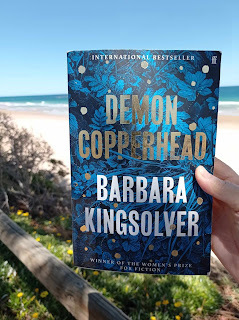
Many generations ago, Charles Dickens wrote David Copperfield from his experience as a survivor of institutional poverty and its damages to children in his society. Those problems have yet to be solved in ours. Dickens is not a prerequisite for readers of this novel, but he provided its inspiration. In transposing a Victorian epic novel to the contemporary American South, Barbara Kingsolver enlists Dickens' anger and compassion, and above all, his faith in the transformative powers of a good story. Demon Copperhead speaks for a new generation of lost boys, and all those born into beautiful, cursed places they can't imagine leaving behind.
MY THOUGHTS:
Whoa, this is a knock-off in a million. No wonder it won the Pulitzer and Women's Fiction prizes for 2023. I was simply curious to see how closely it could stick to the David Copperfield story in such a vastly different time and place, but I didn't expect such evocative writing packed into practically every sentence.
As most of us are aware from the start, it's the story of David Copperfield juxtaposed onto a modern, Appalachian society. Kingsolver expresses her deep concern about the plight of the deplorable foster care system and the opioid crisis strictly within the boundaries of Dickens' famous classic. Modern retellings of classics often strike me as way too overstrained, but this one is written in a way that convinces me this Victorian saga could well have taken place in the 21st century inland USA. It weaves all the counterpart characters in so brilliantly and naturally, it's a joy to spot them all.
Damon Fields, aka Demon Copperhead himself, narrates his own story, starting from the moment he was born to an 18-year-old junkie mother in a humble trailer, intact in his amniotic sac. Sound familiar? His engaging voice, full of sharp discernment and poignant, often dark humour, never falters throughout almost 550 pages. Demon is a budding comic strip artist whose latent genius gives him a knack for capturing anyone's idiosyncratic essence in both words and pictures. If you think the character of Davy Copperfield would take big shoes to fill, I promise you this boy aces it.
Supporting roles are triumphs too. There's Demon's abusive stepfather, Stoner; and the exploitative and harsh foster father, Crickson, nicknamed 'Creaky' by the boys under his care. Here Demon meets the dangerously magnetic Fast Forward, who could make anyone want to do anything and be glad of it; and the good-natured Tommy Waddles, who sketches skeletons as a sort of memento mori gesture, to remind himself that this too will pass. Demon is later fostered with the perpetually desperate and broke McCobb family. These guys have to exercise their creativity just to pay their bills.
We have Miss Betsy Woodall (estranged grandmother this time) and her clever, disabled brother, Mr Dick, whose tributes to his beloved authors is to cover kites with their quotes and then launch them into the sky. Miss Angus Winfield is an edgy, nerdy version of David's Agnes, and his ill-fated relationship with poor, helpless Dori takes on a whole new level - you'll see. And lurking lethally with his reptilian eyes gleaming is the slimy Ryan Pyles, or U-Haul, who keeps insisting that he's nobody special.
Demon actually has what some might call the total package; good looks, witty personality, empathy, intelligence, athleticism and artistic giftedness to boot. The fact that he considers himself an abject failure and nonentity highlights the gaping limitations of his culture and poor start in life more than anything could. ('It dawned on me that I could get run over flat out there, and nobody would know or care what to call the carcass. Road kill?)
From the point of view of a reader already familiar with David Copperfield, it's a winner. And I've noticed that several reviewers who have never read the classic have now added it to their TBR lists, on the strength of this story. I've challenged my kids to read David Copperfield followed by Demon Copperhead, because the effect is bound to impress them. I would always recommend that nobody who has ever read either should start with Dickens followed by Kingsolver.
Demon's take on Charles Dickens is worth mentioning. 'A seriously old guy, dead and a foreigner, but did he get the picture on kids and orphans getting screwed over and nobody giving a rat's ass. You'd think he was from around here.' Well, to take a broad view, Demon, since David Copperfield is regarded as Dickens' most autobiographical novel, and you're modeled on the character of David, then you are that old guy.
This is one of my reading highlights of the year. And my photo is a tribute to Demon's lifelong yearning to visit the beach for real.
(Here is my review of David Copperfield)
🌟🌟🌟🌟🌟
The Vince Review
I invite you to treat this blog like a book-finder. People often ask the question, "What should I read next?" I've done it myself. I try to read widely, so hopefully you will find something that will strike a chord with you. The impressions that good books make deserve to be shared.
I read contemporary, historical and fantasy genres. You'll find plenty of Christian books, but also some good ones from the wider market. I also read a bit of non-fiction to fill that gap between fiction, when I don't want to get straight on with a new story as the characters of the last are still playing so vividly in my head. ...more
- Paula Vince's profile
- 108 followers



